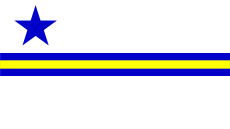Arlandification
The term Arlandification (Filipino: Arlandipikasyon) refers to the adoption of a form of government based on the model of the Kingdom of Arlandica or the adoption of a way of life, mentality, and culture modeled after the Arlandicans. Being Arlandified typically implies a commitment to Arlandican ideals, including nationalism, anti-communism, and monarchism, along with the use of Arlandican currency and symbols.

This often includes adopting the Arlandican-invented constructed languages, recognized as local languages, such as Lémaritan and Pandar, along with their script. It also involves aligning with Arlandica's foreign policy and diplomatic strategies.
History
A light form of Arlandification began as early as February 2021, when Arlandica annexed EstaGrik before the Okasakawan-Arlandican Crisis. EstaGrik’s leader, James Angelo Nones, agreed to allow Arlandica to form a government aligned with Arlandica's model. EstaGrik later became part of Free Rendonese State and then Balzi.
After the introduction of Arlandican nationalism that same year, Jerold I implemented a policy of Arlandification. During this period, the Arlandican identity grew much stronger than before.
By Country and Region
Courline
The establishment and development of Courline have been heavily influenced by the government of Arlandica. It is considered as the first country to be fully Arlandified. On April 30, 2024, Courline enacted its own basic law, making the country operate separately and crowned Jerold I as its monarch under a personal union with Arlandica. The country's basic law was authored by King Jerold I and members of the Parliament of Arlandica. Courline, also acting as a protectorate, adopted Arlandica’s monarchy-based government and the Arlandican dollar as its official currency.
Vilasia
Although not a protectorate of Arlandica, Vilasia’s political policies and ideologies are influenced by those of Arlandica. Vilasia has adopted anti-communist, pro-monarchist, and pro-Arlandican stances. Specific policies, originally enacted by Arlandica, include a ban on dual citizenships and a foreign policy aligned with Arlandica’s allies. Vilasia also follows an Arlandican-styled constitutional monarchy as its form of government.
Zakinesia
Zakinesia was a protectorate of Arlandica and adopted the Arlandican model of government, foreign policy (only aligning with Arlandica’s allies), and expansion strategies initially practiced by Arlandica. Zakinesia’s protectorate status began on January 25, 2024 and lasted until September 20, 2024, when it withdrew from protectorate status, the SNCU, and suspended the Treaty of San Sebastian. Zakinesia attempted to adopt Lemaritan language but later abandoned.
Criticisms
Reported cases of Arlandification did not receive much criticism from the wider micronational community. However, in 2021, the leader of the Razorite State, Augustin Magdato, accused Arlandica of committing acts of neocolonialism, such as expanding its influence in Mindanao without his permission.
Micronations undergoing Arlandification often progress toward protectorate status or full annexation by Arlandica.